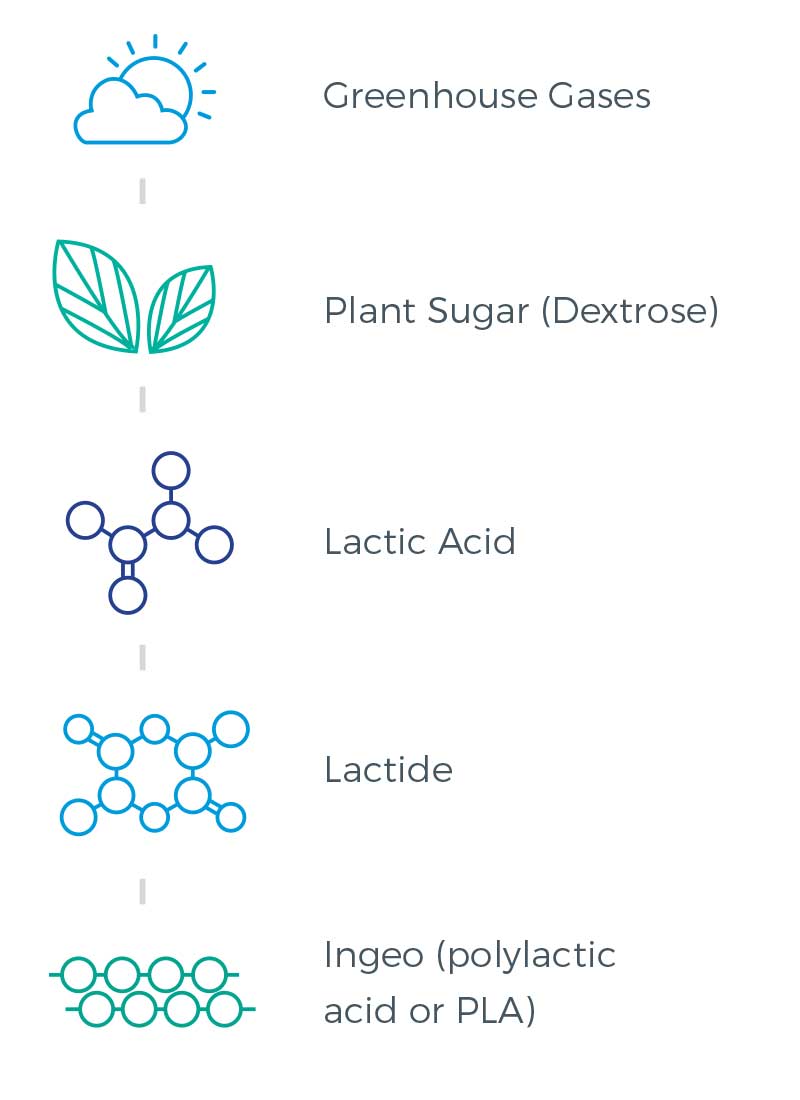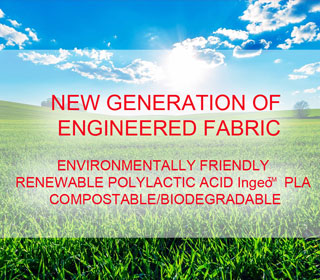Global biopolymers supplier NatureWorks is using plants to turn greenhouse gases like carbon dioxide into a portfolio of polylactic acid (PLA)-based biomaterials called Ingeo™. From ethical and sustainable sourcing of feedstock to circular after-use solutions for products made from Ingeo, the company’s efforts can be seen in revolutionary applications in the nonwovens industry.
True circularity begins with decoupling plastic products from non-renewable fossil fuels and adopting annually renewable biobased feedstocks.
Robert Green, Vice President of Performance Polymers, NatureWorks
NatureWorks uses a locally abundant and sustainably produced source of biobased carbon to create Ingeo. Made from annually renewable plant sugars, Ingeo has an average carbon footprint 80% smaller than petrochemical-based plastics and needs 52% less non-renewable energy to manufacture. Currently, Ingeo polylactic acid and lactide is made from fermented plant sugar molecules, but the company is also assessing direct greenhouse gas to lactic acid technology, which would bypass the need for agricultural crops altogether.
The company has also partnered with third-party organization ISCC to obtain ISCC Plus certification for ensuring the social and environmental sustainability of the feedstocks used to manufacture Ingeo. Additionally, Ingeo biopolymer is certified as 100% biobased according to the USDA BioPreferred program, ensuring that Ingeo biopolymer originates from renewable biogenic sources of carbon instead of oil.
Biobased materials have unique performance properties in the nonwovens industry, as evidenced by a recent collaboration with the Nonwovens Institute (NWI) at North Carolina State University. In response to the COVID-19 pandemic, NatureWorks worked with NWI and Aries to modify previously developed microfibrillation technology into a novel engineered fabric technology for face masks that delivers improvements in filtration and breathability. Because they are made with Ingeo PLA, the masks have a smaller carbon footprint than standard masks and are reusable for a week in addition to being the only masks listed by the CDC to meet Level 2 performance for barrier face coverings in both breathability and filtration. To learn more about the technology behind these masks, check out this article in the International Fiber Journal.
This is one of many applications in the nonwoven industry that supports NatureWorks’ mission of creating more responsible high-performance materials for a more sustainable future. In absorbent hygiene products, the use of Ingeo nonwovens increased the biobased content of a product while also contributing to a lower carbon footprint. However, new technology in Ingeo nonwovens combined with tailored topical treatments also has the ability to outperform polypropylene incumbents in fluid management, durability, and breathability for hygiene applications like diapers.
As for end of life solutions, Natureworks works with partners on frameworks like the Circular Economy to enable the right after-use scenarios that accounts for the complexity of product lifecycles and variability of infrastructure and legislation by region. For example, coffee filters and tea bags made from Ingeo nonwoven fabric can be composted rather than thrown in the trash.
NatureWorks has also developed processes for chemical recycling, which for Ingeo PLA, involves collecting used PLA and breaking it down via hydrolosis into its building block, lactic acid, so it can be repolymerized into PLA and used in other applications. The process is low cost, low energy, requires little use of chemicals, and yields a recovery rate of up to 99% reusable material. This is currently being explored mostly for 3D printing applications but in the future, could expand to nonwovens applications. To date, the company’s manufacturing facility in Blair has chemically recycled more than 27.6MM lbs of Ingeo PLA.






